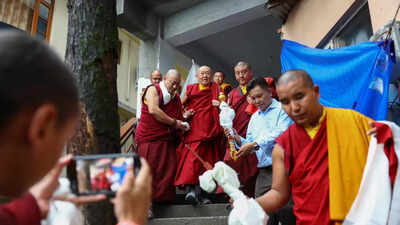As the 14th Dalai Lama reaches his 90th birthday, global attention turns to the burning issue of who will be his successor. Respected globally as a Nobel Peace Prize laureate and among the world’s most influential spiritual leaders, his visions-to-be successor holds tremendous religious and political significance. Not only is the question of the next Dalai Lama a matter of spiritual concern to Tibetan Buddhists, but also a matter of high geopolitical consequence. With China wielding its dominance over the succession process and the US and India supporting Tibetan autonomy, succession debate is defining international relations and religious freedom for generations to come.
Dalai Lama signals new succession framework ahead of 90th birthday
On Monday, June 30, the 14th Dalai Lama—Tibet’s spiritual leader for Tibetan Buddhism—announced that the future of the Dalai Lama lineage would be based on “some kind of a framework,” generating international interest and speculation. The comment is especially notable as it precedes his 90th birthday, observed on Sunday, July 6.
In 2011, the Dalai Lama had announced that at the age of 90, he would meet with senior Tibetan Buddhist leaders and the wider Tibetan community to reconsider if the Dalai Lama institution should remain as it is. With that milestone now upon him, his latest statements revived the conversation regarding succession and the future of Tibetan spiritual leadership.
Buddhist leaders to gather in Dharamshala for key conference
Between July 2 and July 4, a major Buddhist religious congregation in McLeodganj, Dharamshala, where more than 100 elderly monks and scholars are likely to be present. One of the most eagerly looked-forward-to moments is a video address from the Dalai Lama, which could reveal the manner in which his reincarnation is to be found and chosen—a matter of gigantic religious and political importance.
Why the Dalai Lama’s succession is a global issue
The identification of the next Dalai Lama goes far beyond religious significance. It has significant geopolitical consequences for countries like China, India, and the United States.After the 1959 rebellion against Chinese occupation in Tibet, the Dalai Lama escaped to India with almost 80,000 followers and set up a government-in-exile in Dharamshala. He has been an international icon of peace and Tibetan cultural identity ever since—something the Chinese government regards as a direct provocation. Beijing has always referred to him as a “wolf in monk’s robes” and has attempted to dominate the reincarnation process to secure its grip on Tibet and its religious institutions. Consequently, the Dalai Lama succession has turned into a polarized and politically sensitive matter on the world stage.
Dalai Lama predicts his reincarnation will be born outside China
In his 2025 book, “Voice for the Voiceless,” the Dalai Lama intimated that his reincarnation would be born outside China—a strong claim that goes against Beijing’s narrative. Recently, speaking in Dharamshala, he stated that a “framework” would shortly be established for choosing his successor, though no details have been officially announced.The Gaden Phodrang Foundation, which is the official Tibetan trust of the Dalai Lama, and the Tibetan parliament-in-exile is likely to administer the process of recognition of the next Dalai Lama. This system is viewed as a means for safeguarding the spiritual autonomy of Tibetan Buddhism from political interference by Beijing.
China asserts jurisdiction over Dalai Lama’s reincarnation process
According to BBC reports, he said only the foundation he set up could recognise a future Dalai Lama – “no one else has any such authority to interfere”. The Chinese government asserts that it has a right to endorse the next Dalai Lama based on historical practice during the Qing Dynasty. During 1793, the Qing established a system of using a golden urn to cast lots and validate reincarnations. China has subsequently argued this ceremony legitimates its authority over the process of reincarnation.Beijing also enacted legislation that any reincarnated lamas have to be sanctioned by the Communist Party, particularly if they carry significant influence beyond China. Most Tibetans, however, perceive this as a ploy to replace a politically subservient figurehead, thus weakening the exile movement and diluting Tibetan identity.Also Read | Rare roll cloud stuns beachgoers in Portugal amid heatwave, video goes viral; here’s what it means

